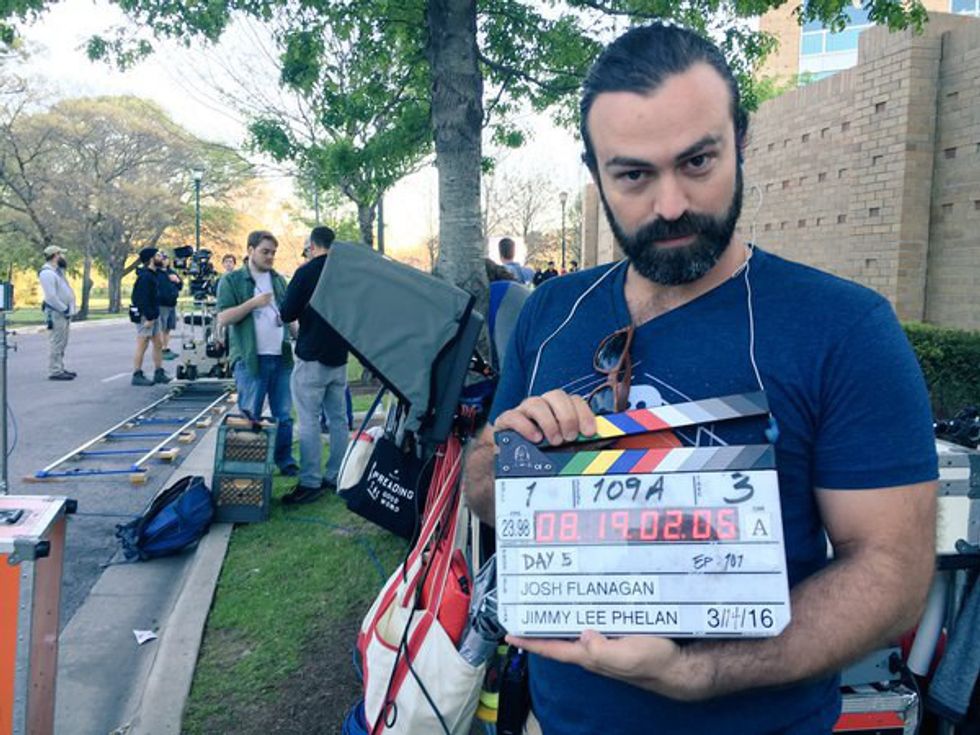I was extremely lucky to be able to interview Josh Flanagan of Rooster Teeth. If you remember my first article on "Day 5" then you will remember he was the show runner for it. In addition to this, he is the writer behind both "Ten Little Roosters" and "Eleven Little Roosters", shows with a new concept behind them; the idea of a metagame. When I asked Josh Flanagan about it, he explained, saying " ten little roosters started as a metagame. I was trying to look at a web series and see what else it could be, besides a smaller version of a TV show." He also sees this as a way to bring in new gaming elements into web series, bringing on a new kind of video that I personally believe makes us interact and pulls us in the show more.
When asked more about "Ten Little Roosters" Flanagan went more into how things happened and how he viewed the show. "I view ten little roosters as a proof of concept." He also said he only had five weeks to shoot and two weeks to write. Flanagan added "when
I also asked about "Day 5", starting with what it was like to be the show runner. Flanagan said " I oversaw the writing of the scripts, casting, and pretty much anything creative comes through me at some point." and he gave a great example of the plane crash, of how he brought story boards to their producers so that the logistics and creative ends run smoothly. He said " The biggest lesson I learned doing it was to stay vigilant. I kept going back to "Harry Potter" when Professor Moody would keep telling Harry 'Constant Vigilance' and that kept going through my mind every day. You hit these points where you realize that it would have been worse if I had gotten lazy, we would have missed this moment". He went on to say that even one line of dialogue can change everything.
"Day 5" originally came from a short done by Josh Flanagan and Chris Demaris. Flanagan explained "We wanted to make something really unique and interesting. We looked at the pace of 24 and at Crank to help show the immediate need for a resource". When asked what creates the emotional connection in the show he was surprised. He said that they tried to add more humor to the show to make it more realistic to an apocalypse. The characters who live on the fringe of society, who were up during this time, become our main characters as opposed to self-righteous ones. They hoped it would add in more layers of emotions. In addition to this, there was a relatability to this premise because all of us have felt tired before but none of us have fought zombies off.
I began to ask questions more about writing/directing/show running after this.
I asked if "writing what you know has ever made writing harder?" He responded, "that it is a tricky phrase because it implies not writing outside what you know. I think the trick is finding ways to work in characters you know or find a way to make it relatable to you as a writer". It is an easy thing that can go wrong when you want to write something just to make it dramatic without the real emotion or story arch. Josh Flanagan said "Understand why you are telling that specific story" which I think is advice we can all learn from.
I asked what it's like to work for "Rooster Teeth" and he said awful.
Just kidding, He said it is hard to explain. The company is different than anything we could try to relate to. With a hectic schedule like his, I can see why, though he said he does enjoy his time at work.
We ended with a question about advice he would have for people like me and you, who wish to work with cinematography, writing or productions. He said "Constant Vigilance" as well as know your vision and trust in your actors. If you see them understand the vision do not get mad at them for going off script if they're going in the right direction, but at the same time, you need to be able to tell them no when they're taking it in another direction.
"I have always approached it as wanting to create a good experience for people, in whatever medium that ends up in. My big target is film." At the end of the day, you should meet talented people and do as much work as you can. "I wouldn't worry about stuff like that, to be honest, companies change all the time, RT is not the same company it was ten years go and it won't be ten years from now. I worry about that because I don't want people to put that as their guidepost and not work on their craft. Hopefully, if you're writing, directing, doing cinematography it's cause you love them and want to get better at it for the experience for the audience or to tell a personal story, and that's always got to be your focus, it can't be a company. Focus on your craft" and I don't think that I could have heard better advice than that.



















